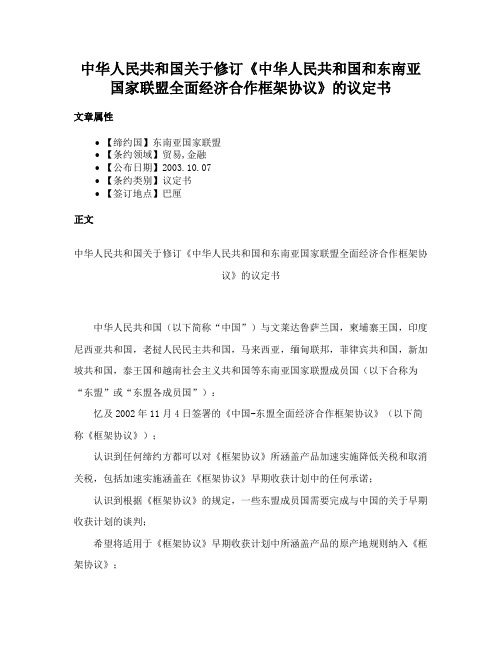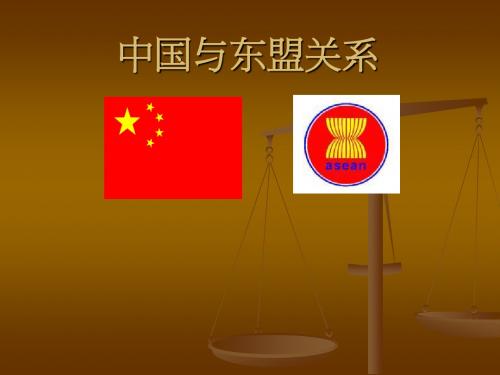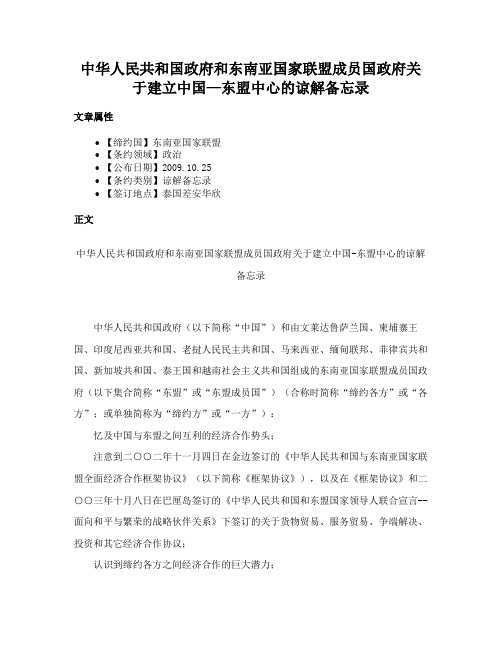中华人民共和国与东南亚国家联盟
中华人民共和国关于修订《中华人民共和国和东南亚国家联盟全面经济合作框架协议》的议定书

中华人民共和国关于修订《中华人民共和国和东南亚国家联盟全面经济合作框架协议》的议定书文章属性•【缔约国】东南亚国家联盟•【条约领域】贸易,金融•【公布日期】2003.10.07•【条约类别】议定书•【签订地点】巴厘正文中华人民共和国关于修订《中华人民共和国和东南亚国家联盟全面经济合作框架协议》的议定书中华人民共和国(以下简称“中国”)与文莱达鲁萨兰国,柬埔寨王国,印度尼西亚共和国,老挝人民民主共和国,马来西亚,缅甸联邦,菲律宾共和国,新加坡共和国,泰王国和越南社会主义共和国等东南亚国家联盟成员国(以下合称为“东盟”或“东盟各成员国”):忆及2002年11月4日签署的《中国-东盟全面经济合作框架协议》(以下简称《框架协议》);认识到任何缔约方都可以对《框架协议》所涵盖产品加速实施降低关税和取消关税,包括加速实施涵盖在《框架协议》早期收获计划中的任何承诺;认识到根据《框架协议》的规定,一些东盟成员国需要完成与中国的关于早期收获计划的谈判;希望将适用于《框架协议》早期收获计划中所涵盖产品的原产地规则纳入《框架协议》;希望修改《框架协议》现有的附件1和附件2的内容,以纳入中国与一些东盟成员国之间达成的早期收获协议,并增补相关的HS税号和产品描述;期望对《框架协议》中早期收获计划的各项条款的实施予以澄清说明;期望通过双边或诸边协议或安排来对加速实施《框架协议》早期收获计划中所涵盖产品降低和/或取消关税的方式和条件做出规定,并规定将此类协议或安排有效地附于《框架协议》:注意到《框架协议》第14条规定,任何以后的修订都需要各缔约方以书面形式相互同意。
现达成协议如下:第一条对《框架协议》第6条第3款(a)(iV)的修订删除《框架协议》第6条第3款(a)(iv),由如下新的第6条第3款(a)(iv)取代:对于未能完成附件1和附件2中的适当的产品清单的缔约方,产品清单仍可在相互同意的基础上并根据本协议附件3规定的实施时间框架制订完成。
中国在东南亚国家联盟的作用

中国在东南亚国家联盟的作用作为东南亚地区的大国,中国在东南亚国家联盟(简称为东盟)发挥着重要的作用。
中国与东盟国家有着长期的友好合作关系,双方在政治、经济、文化等领域展开了广泛的交流与合作,互惠互利,共同推动了地区的和平与繁荣。
首先,中国作为东盟国家的重要贸易伙伴,对地区的经济发展起着积极的推动作用。
中国与东盟签署了自由贸易协定,大大促进了双方的经贸往来。
中国是东盟最大的贸易伙伴,而东盟也是中国第三大贸易伙伴。
中国一直致力于提升与东盟国家的经贸合作水平,通过加强投资、技术合作与贸易便利化等途径,共同推动了区域内国家的经济发展与繁荣。
此外,中国还倡导与东盟国家共建“一带一路”倡议,通过基础设施建设、产能合作等方式,进一步提升了东盟国家的发展能力与水平。
其次,中国在地区安全事务中扮演着积极的角色。
中国与东盟国家一直致力于加强地区间的对话与合作,共同维护地区的和平与安全。
在南海问题上,中国与东盟国家通过对话与磋商寻求共识,建立了一系列的合作机制,如中国与东盟国家签署的《南海各方行为宣言》,旨在通过和平手段解决争端,维护南海地区的稳定与和平。
同时,中国还加强了与东盟国家在反恐怖主义、打击跨国犯罪等方面的合作,共同应对地区面临的安全挑战。
此外,中国与东盟国家积极促进人文交流与文化交流。
双方在教育、文化、旅游等方面的交流与合作不断加强,增进了人民之间的了解与友谊。
中国与东盟国家还共同举办了一系列的文化交流活动,如中国-东盟青年运动会、中东盟电影节等,为青年和普通民众之间的交流搭建了平台。
通过这些交流与合作,加深了中国与东盟国家之间的友好关系,也为地区的和平与稳定作出了贡献。
总的来说,中国作为东盟国家的重要伙伴,对地区的发展与合作起到了积极的推动作用。
通过加强经贸合作、促进地区安全与稳定以及推动人文交流与文化交流等方式,中国与东盟国家共同致力于实现共同繁荣与发展,为地区的和平与稳定做出了重要的贡献。
中华人民共和国政府和东南亚国家联盟成员国政府海运协定

中华人民共和国政府和东南亚国家联盟成员国政府海运协定文章属性•【缔约国】东南亚国家联盟•【条约领域】海上运输•【公布日期】2007.11.02•【条约类别】协定•【签订地点】新加坡正文中华人民共和国政府和东南亚国家联盟成员国政府海运协定中华人民共和国政府(以下简称“中国”或“缔约一方”)为一方,文莱达鲁萨兰国、柬埔寨王国、印度尼西亚共和国、老挝人民民主共和国、马来西亚、缅甸联邦、菲律宾共和国、新加坡共和国、泰王国、越南社会主义共和国政府,作为东南亚国家联盟成员国的政府(以下简称“东盟成员国”或合指“缔约一方”)为另一方;并且以下双方合指简称“缔约双方”;考虑到2002年11月4日在柬埔寨金边签订的《中国-东盟全面经济合作框架协议》;考虑到2004年11月27日在老挝万象签订的《中华人民共和国政府与东盟成员国政府交通合作谅解备忘录》;考虑到2004年11月29日在老挝万象签订的《执行加强中国-东盟战略合作伙伴关系实现和平与繁荣联合宣言的行动计划》;考虑到中国和东盟成员国之间业已存在的海运关系的重要性;相信缔约双方在国际海运领域的合作将有利于中国和东盟成员国之间的贸易和经济关系的发展;愿意在平等互利基础上进一步加强和巩固在国际海运领域的关系;认识到旨在提高运输链效率的海运服务的重要性;愿意相互间进一步合作与沟通,消除阻碍海运服务的障碍,并建立区域性海运框架体系以促进海运便利化;考虑到中国与东盟成员国现有的双边海运协定;达成协定如下:第一条目的本协定旨在提供便利和合作从而为缔约双方经营者改善缔约双方港口之间以及缔约双方港口与第三国港口之间的海上货物和旅客运输经营条件。
缔约双方应制止任何有可能损害缔约双方航运公司不受限制地参与缔约双方之间以及缔约双方与第三国之间的海上运输的行动。
第二条范围一、本协定适用于中国港口与东盟成员国港口之间的国际海上货物和旅客运输。
二、本协定不适用于仅在中国港口之间或任一个东盟成员国内部港口之间的国内海运。
中国-东盟原产地规则

中国-东盟自由贸易区原产地规则根据《中华人民共和国与东南亚国家联盟全面经济合作框架协议》(以下简称《协议》)可享受优惠关税减让的产品,其原产地应遵循下列规则确定:规则一:定义在本附约中:(一)“一成员方”是指《协议》的各单独成员方,即:中华人民共和国、文莱达鲁萨兰国、柬埔寨王国、印度尼西亚共和国、老挝人民民主共和国、马来西亚、缅甸联邦、菲律宾共和国、新加坡共和国、泰王国和越南社会主义共和国。
(二)“材料”应包括组分、零件、部件、半组装件及/或已实际上构成另一货物部分或已用于另一货物生产过程的货物。
(三)“原产货物”是指根据规则二的规定确定为符合原产条件的产品。
(四)“生产”是指获得货物的方法,包括一货物的种植、开采、收获、饲养、繁殖、提取、收集、采集、捕获、捕捞、诱捕、狩猎、制造、生产、加工或装配。
(五)“产品特定原产地标准”是指规定材料已经过税号改变或特定制造或加工工序,或满足某一从价百分比标准,或者混合使用任何这些标准的规则。
规则二:原产地标准在本《协议》中,如果一成员方进口的产品符合以下任何一项原产地要求,该产品应视为原产货物并享受优惠关税减让:(一)规则三明确规定的完全获得或生产的产品;或(二)符合规则四、五或六规定的非完全获得或生产的产品。
规则三:完全获得产品下列产品应视为规则二(一)所指的“完全在一成员方获得或生产”:(一)在该成员方收获、采摘或收集的植物及植物产品;(二)在该成员方出生及饲养的活动物;(三)在该成员方从上述第(二)项活动物中获得的产品;(四)在该成员方狩猎、诱捕、捕捞、水生养殖、收集或捕获所得的产品;(五)从该成员方领土、领水、海床或海床底土开采或提取的除上述第(一)至(四)项以外的矿物质或其他天然生成的物质;(六)在该成员方领水以外的水域、海床或海床底土获得的产品,但该成员方须按照国际法规定有权开发上述水域、海床及海床底土;(七)在该成员方注册或悬挂该成员方国旗的船只在公海捕捞获得的鱼类及其他海产品;(八)在该成员方注册或悬挂该成员方国旗的加工船上仅加工及/或制造上述第(七)项的产品所得的产品;(九)在该成员方收集的既不能用于原用途,也不能恢复或修理,仅适于用作弃置或原材料部分品的回收,或者仅适于作再生用途的物品;(十)仅用上述第(一)至(九)项所列产品在一成员方加工获得的产品。
中国与东盟关系 - 浅析中国与东盟经贸关系

2002年9月13日,首次中国-东盟经济贸易部长会议在文莱首都斯里巴加 2002年 13日 首次中国- 湾市举行.通过了《中国-东盟全面经济合作框架协议》草案. 湾市举行.通过了《中国-东盟全面经济合作框架协议》草案. 2002年 20日 首次中国与东盟(10+ 交通部长会议通过今年5 2002年9月20日,首次中国与东盟(10+1)交通部长会议通过今年5月 交通高官会议提出的"东盟-中国交通合作职责范围" 交通高官会议提出的"东盟-中国交通合作职责范围", 并就今后具体合作重点项目达成一致意见. 并就今后具体合作重点项目达成一致意见. 2002年10月11日 由中国人民银行主办的东盟和中, 10+ 2002年10月11日,由中国人民银行主办的东盟和中,日,韩(10+3)"短 期 资 本流动管理与资本帐户开放"高级研讨会在北京召开. 本流动管理与资本帐户开放"高级研讨会在北京召开.会议围 绕 短期资本流动管理与资本帐户开放的有关问题进行了深入研讨. 短期资本流动管理与资本帐户开放的有关问题进行了深入研讨. 2002年10月26日 由中国首次举办的"中国——东盟宏观经济论坛 东盟宏观经济论坛" 2002年10月26日,由中国首次举办的"中国——东盟宏观经济论坛"在昆明举 行. 2002年11月 10+ 10+ 高官会在柬埔寨首都金边举行. 2002年11月1日,10+3和10+1高官会在柬埔寨首都金边举行. 2002年11月 中国与东盟各国外长及外长代表在金边签署了《 2002年11月4日,中国与东盟各国外长及外长代表在金边签署了《南海各方行为 宣言》 宣言》. 2003年 29日 中国-东盟领导人关于非典型肺炎特别会议在曼谷举行.同日, 2003年4月29日,中国-东盟领导人关于非典型肺炎特别会议在曼谷举行.同日, 东 盟与中日韩高官会在柬埔寨北部城市暹粒举行. 盟与中日韩高官会在柬埔寨北部城市暹粒举行. 2003年10月 次东盟与中国(10+ 2003年10月,第7次东盟与中国(10+1)领导人会议在印度尼西亚巴厘岛举 行. 中国政府宣布加入《东南亚友好合作条约》 中国政府宣布加入《东南亚友好合作条约》,并与东盟签署了宣布建 面向和平与繁荣的战略伙伴关系"的联合宣言. 立"面向和平与繁荣的战略伙伴关系"的联合宣言. 2004年11月 首届中国-东盟博览会在中国的广西壮族自治区首府南宁举行. 2004年11月3日.首届中国-东盟博览会在中国的广西壮族自治区首府南宁举行.
中华人民共和国政府和东南亚国家联盟成员国政府关于建立中国—东盟中心的谅解备忘录

中华人民共和国政府和东南亚国家联盟成员国政府关于建立中国—东盟中心的谅解备忘录文章属性•【缔约国】东南亚国家联盟•【条约领域】政治•【公布日期】2009.10.25•【条约类别】谅解备忘录•【签订地点】泰国差安华欣正文中华人民共和国政府和东南亚国家联盟成员国政府关于建立中国-东盟中心的谅解备忘录中华人民共和国政府(以下简称“中国”)和由文莱达鲁萨兰国、柬埔寨王国、印度尼西亚共和国、老挝人民民主共和国、马来西亚、缅甸联邦、菲律宾共和国、新加坡共和国、泰王国和越南社会主义共和国组成的东南亚国家联盟成员国政府(以下集合简称“东盟”或“东盟成员国”)(合称时简称“缔约各方”或“各方”;或单独简称为“缔约方”或“一方”):忆及中国与东盟之间互利的经济合作势头;注意到二○○二年十一月四日在金边签订的《中华人民共和国与东南亚国家联盟全面经济合作框架协议》(以下简称《框架协议》),以及在《框架协议》和二○○三年十月八日在巴厘岛签订的《中华人民共和国和东盟国家领导人联合宣言--面向和平与繁荣的战略伙伴关系》下签订的关于货物贸易、服务贸易、争端解决、投资和其它经济合作协议;认识到缔约各方之间经济合作的巨大潜力;认识到合作是基于平等、友好和互利;强调本谅解备忘录下的合作领域应是其它中国-东盟机制下开展活动的补充;达成共识如下:第一条建立和地点一、缔约各方应据此建立一个一站式的信息和活动中心,即中国-东盟中心(以下简称“中心”),以在私营部门的积极参与下,促进中国-东盟贸易、投资、旅游、教育和文化领域的合作。
中心应逐渐扩展,开展更广泛领域的活动,吸引更多参与者。
二、中心应是一个非营利组织,但能筹集自身运营所需资金。
三、中心的总部设在北京。
今后可在东盟各成员国和中国的其它地区设立分中心。
第二条目标中心的目标是:(一)支持《框架协议》以及在该协议下签订的关于货物贸易、服务贸易、争端解决、投资及其它经济合作协议的落实;(二)加强中国与东盟之间的双向贸易,进一步发展贸易伙伴关系,以共同促进对域外市场的出口并实现市场扩大;(三)促进中国与东盟之间的双向投资;(四)开展活动帮助来自欠发达东盟成员国,特别是柬埔寨、老挝、缅甸和越南的投资者和商人在中国寻求贸易和投资机会;(五)促进中国和东盟之间游客的往来;(六)加强中国和东盟企业界间的交流;(七)通过文化和教育交流,加强中国与东盟人民之间的民间交流、公众认知、相互理解和积极参与;(八)协同增强中国和东盟的潜力,以加强本地区对域外伙伴的吸引力,为其与中国和东盟企业联系提供便利。
中国与东盟
中国与东盟的关系(一)中国与东南亚邻国的关系可以追溯到古代,虽然受到当时地理和交通手段的限制,但是中国与东南亚国家的文化交流和商贸关系就已开始。
19世纪以后,由于中国移民在东南亚地区不断增加,中国与东南亚地区的商贸关系越来越密切。
与此同时,中国与东南亚国家都遭受了西方殖民主义的入侵。
新中国成立后,中国与东南亚国家的关系主要受意识形态和政治因素的左右,1967年东盟成立,双方相互疑,有时甚至视对方为自身安全的威胁,相互敌对。
因此,双方的经济关系难以得到正常的发展。
二十世纪70年代以来,地区国际关系的变化,使中国与东盟的关系也随之得到改善。
用了将近1O年的时间,中国与东盟才开始进行官方往来。
1974年,马来西亚率先与中国建交,次年,菲律宾和泰国也与中国建交。
中国与东盟的关系90年代初达到高潮。
中国与印度尼西亚恢复了外交关系,并分别与新加坡和文莱建立了外交关系。
另外,中国与越南在经历了十多年的相互对抗后,也实现了关系的正常化。
至此,自从东盟成立以来,中国首次与所有的东盟国家建立了正常的国家关系,双方关系进入最佳时期。
1997年,东盟成立30周年,江泽民主席在出席中国—东盟领导人非正式会晤时,发表了题为《建立面向21世纪的睦邻互信伙伴关系》的重要讲话,为双方关系全面和深入发展指明了方向,构筑了框架。
会晤结束后,双方发表了《中华人民共和国与东盟国家首脑会晤联合声明》,双方关系走向成熟。
(二)中国与东盟的经济关系发展迅速是国际政治、经济形势变化的结果和中国与东盟国家发展经济的需要。
第一,冷战后,在新型的国际政治、经济关系形势发展过程中,要求国际间的相互依存,推动了中国与东盟之间的合作。
东盟的成立目的就是谋求成员国之间的经济和社会文化之间的合作。
90年代后,东盟加快了组织内部的合作步伐,并积极参与亚大地区更大范的经济合作。
而中国自70年代末实施“改革开放”政策以来,日益紧密地与世界经济联系在一起。
发展中国家的中国与东盟在地区经济新秩序的建立过程中,经济关系不断密切,合作领域不断扩大。
中华人民共和国政府和东南亚国家联盟成员国政府海运协定英文版
2007 AGREEMENT ON MARITIME TRANSPORT BETWEEN THE GOVERNMENTS OF THE MEMBER COUNTRIES OF ASSOCIATION OF SOUTHEAST ASIAN NATIONS AND THE GOVERNMENT OF THEPEOPLE’S REPUBLIC OF CHINASigned in Singapore on 2 November 2007[/21156.htm]ARTICLE 1 AIM (2)ARTICLE 2 SCOPE (3)ARTICLE 3 DEFINITION (3)ARTICLE 4 TREATMENT IN PORTS (4)ARTICLE 5 FACILITATION OF TRANSPORT (4)ARTICLE 6 SHIP’S DOCUMENTS (4)ARTICLE 7 ASHORE, ENTRY, DEPARTURE AND TRANSIT BY CREW MEMBERS (4)ARTICLE 8 JURISDICTION ON BOARD VESSELS (5)ARTICLE 9 PAYMENT AND REMITTANCE (6)ARTICLE 10 MARITIME COOPERATION (6)ARTICLE 11 MUTUAL CONSULTATION (6)ARTICLE 12 SETTLEMENT OF DISPUTES (7)ARTICLE 13 CONFIDENTIALITY (7)ARTICLE 14 ENTRY INTO FORCE, DURATION AND AMENDMENT (7)ARTICLE 15 RELATION WITH EXISTING BILATERAL MARITIME TRANSPORT AGREEMENTS (7)ARTICLE 16 PROTECTION OF NATIONAL SECURITY AND PUBLIC HEALTH (8)The Governments of Brunei Darussalam, the Kingdom of Cambodia, the Republic of Indonesia, the Lao People’s Democratic Republic (“Lao PDR”), Malaysia, the Union of Myanmar, the Republic of the Philippines, the Republic of Singapore, the Kingdom of Thailand, the Socialist Republic of Viet Nam as Member Countries of the Association of Southeast Asian Nations (hereinafter referred to as “Member Countries of ASEAN” or collectively “a Contracting Party”) on the one side, and the Government of the People’s Republic of China (hereinafter referred to as “China” or “a Contracting Party”) on the other; and both sides hereinafter referred to collectively as “Contracting Parties”;TAKING INTO ACCOUNT the Framework Agreement on the Comprehensive Economic Cooperation between ASEAN and China, signed on 4th November 2002 in Phnom Penh, Cambodia;TAKING INTO ACCOUNT the Memorandum of Understanding between the Governments of the Member Countries of ASEAN and the Government of the People’s Republic of China on Transport Cooperation signed on 27th November 2004 in Vientiane, Lao PDR;TAKING INTO ACCOUNT the Plan of Action on Implementing the Joint Declaration on Strengthening ASEAN-China Strategic Partnership towards Peace for Prosperity signed on 29th November 2004 in Vientiane, Lao PDR;TAKING INTO ACCOUNT the importance of the maritime relations existing between the Member Countries of ASEAN and China;BELIEVING that cooperation in the international maritime transport field between the Contracting Parties will be beneficial for the development of the trade and economic relations between the Member Countries of ASEAN and China;WILLING to further strengthen and consolidate the relations, on the basis of equality and mutual benefits in the field of international maritime transport;RECOGNISING the importance of maritime transport in order to increase efficiencies in the transport chain;WILLING to further cooperate and communicate with each other, eliminate barriers hindering maritime transport, and establish regional maritime transport framework system with the aim to promote maritime transport facilitation;TAKING INTO ACCOUNT the existing bilateral maritime agreements between the Member Countries of ASEAN and China;HAVE AGREED as follows:ARTICLE 1 AIMThis Agreement is aimed at providing facilitation and cooperation in improving the conditions under which maritime cargo and passenger transport operations are carried out between the ports of the Contracting Parties, as well as between the ports of the Contracting Parties and theports of third countries, for the benefit of economic operators of the Contracting Parties. The Contracting Parties shall refrain from any action that might be detrimental to the unrestricted participation of shipping companies of the Contracting Parties in maritime transport between the Contracting Parties as well as between the Contracting Parties and third countries.ARTICLE 2 SCOPE1. This Agreement applies to the international maritime cargo and passenger transport between the ports of the Member Countries of ASEAN and China.2. This Agreement shall not apply to domestic maritime transport purely between the ports within any Member Country of ASEAN or between the ports of China.3. This Agreement shall not affect the application of the bilateral agreements concluded between the Member Countries of ASEAN and China for issues falling outside the scope of this Agreement.4. This Agreement shall not affect the right of vessels of third parties to engage in cargo and passenger transport between the ports of the Contracting Parties or between the ports of either Contracting Party and a third party.ARTICLE 3 DEFINITIONFor the purpose of this Agreement:1. “vessel” means any merchant ship registered in accordance with the laws of a Member Country of ASEAN or China in the vessel registration office of either Contracting Party under the national flag of that Contracting Party and engaged in international maritime transport, including vessels flying the flag of a third country but owned or operated by a shipping company of a Member Country of ASEAN or China. However, this term shall not include warships and any other non-commercial ships.2. “crew member” means the master or any person employed on board a vessel, in duties and services connected with the running of the vessel and whose name is included in the crew list and holds a valid identity document issued or recognised by the competent authorities of his/her country.3. “ports” means seaports including roadsteads, in the territory of a Member Country of ASEAN or China which are approved and open to international shipping.4. “shipping company” is an enterprise which meets all of the following conditions:a. being established in accordance with the laws, rules and regulations of a MemberCountry of ASEAN or China;b. having its registered office or head office in a Member Country of ASEAN or China;c. engaging in international shipping services with its own or operated vessels; andd. being an independent legal entity in accordance with the laws, rules and regulations of aMember Country of ASEAN or China.ARTICLE 4 TREATMENT IN PORTSEach Contracting Party shall grant the vessels of the other Contracting Party, their crew members, passengers and cargoes on board the treatment no less favorable than granted to vessels of a third country in regard to:a. the access to ports open to international maritime traffic;b. the stay in ports and departure therefrom;c. the use of port facilities for cargoes and passengers transport as well as regarding theaccess to any services and other facilities available in ports;d. the collection of fees and port charges.ARTICLE 5 FACILITATION OF TRANSPORTThe Contracting Parties shall, within the limits of their respective laws, rules and regulations, take all appropriate measures to avoid any unnecessary delay as well as to expedite and simplify the administrative, customs, sanitary and other formalities in force in their ports.ARTICLE 6 SHIP’S DOCUMENTS1. Each Contracting Party shall recognise the certificates of registry/nationality and other ship’s documents held by vessels of the other Contracting Party and issued by the competent authorities of the flag state.2. Vessels of one Contracting Party holding valid tonnage certificates issued in compliance with the International Convention on Tonnage Measurement of Ships, 1969, as amended, and accepted by the other Contracting Party shall not be re-measured in the ports of the other Contracting Party. All the dues and charges based on the tonnage of vessels shall be calculated and collected in accordance with the above-mentioned certificates.ARTICLE 7 ASHORE, ENTRY, DEPARTURE AND TRANSIT BY CREWMEMBERS1. Either Contracting Party shall, in accordance with its laws, rules and regulations in force, recognise the identity documents of the crew members, issued or recognised by the competent authorities of the other Contracting Party.2. Either Contracting Party shall allow, in accordance with its laws, rules and regulations in force, crew members of a vessel of the other Contracting Party, who hold the valid identitydocuments, as referred to in Article 3, to go ashore and to stay in the port town area during the stay of their vessel in any of its ports.3. Either Contracting Party shall allow, in accordance with its laws, rules and regulations in force, crew members of the other Contracting Party, who hold a valid identity document, to enter, leave, or pass through its territory, by means of any traffic, on account of repatriation, joining a vessel or other reasons acceptable to its competent authorities.4. Either Contracting Party, in accordance with its laws, rules and regulations in force, reserves the right to deny the entry into and stay within its territory of any crew members it may regard as undesirable.ARTICLE 8 JURISDICTION ON BOARD VESSELS1. Either Contracting Party shall not exercise criminal jurisdiction on board vessels of another Contracting Party passing through their territorial sea to arrest any person or to conduct any investigation in connection with any crime committed on board the vessels during their passage, save only in the following cases:a. if the consequences of the crime extend to the Contracting Party;b. if the crime is of a kind to disturb the peace of the Contracting Party or the good order ofits territorial sea;c. if the assistance of the local authorities has been requested by the master of the vesselor by a diplomatic agent or consular officer of the Contracting Party; ord. if such measures are necessary for the suppression of illicit traffic in narcotic drugs orpsychotropic substances.2. The above provisions do not affect the right of the Contracting Party to take any steps authorised by its laws, rules and regulations for the purpose of an arrest or investigation on board vessels of another Contracting Party passing through the territorial sea after leaving internal waters.3. In the cases provided for in paragraphs 1 and 2, the Contracting Party shall, if the master so requests, notify a diplomatic agent or consular officer of the other Contracting Party before taking any steps, and shall facilitate contact between such agent or officer and the vessel's crew. In cases of emergency, this notification may be communicated while the measures are being taken.4. In considering whether or in what manner an arrest should be made, the local authorities shall have due regard to the interests of navigation.5. Except as provided for in internationally adopted rules and principles: (a) governing the protection and preservation of the marine environment; or (b) with respect to violations of laws, rules and regulations adopted in relation to the specific legal regime, and the rights, jurisdiction and duties of the coastal and other states in the exclusive economic zones; the Contracting Party may not take any steps on board vessels of another Contracting Party passing through the territorial sea to arrest any person or to conduct any investigation in connection with anycrime committed before the vessel entered the territorial sea, if the vessel, proceeding from a foreign port, is only passing through the territorial sea without entering internal waters.ARTICLE 9 PAYMENT AND REMITTANCE1. Revenues of shipping companies of one Contracting Party derived from international maritime transport in the other Contracting Party may be settled in freely convertible or usable currencies, in accordance with the exchange regulations in force in the other Contracting Party.2. The shipping companies of one Contracting Party shall have the right to use their income from the shipping services derived in the territory of the other Contracting Party towards shipping-related payments, in accordance with that other Contracting Party’s laws, rules and regulations. Alternatively, the income may be transferred abroad in freely convertible or usable currencies, in accordance with the exchange regulations in force in that other Contracting Party.ARTICLE 10 MARITIME COOPERATIONThe Contracting Parties shall, with the aim of promoting the development of their maritime industry, subject to their respective laws, rules and regulations encourage their competent authorities, shipping companies, ports, relevant research institutions, colleges, universities and maritime education and training institutions to cooperate in, including but not limited to, the following fields:a. exchange views on issues related to their maritime transport activities;b. exchange information on legislation and regulations concerning maritime transport;c. promote efficiency of transport service for international sea trade by effectiveadministration of the ports and fleets of the Contracting Parties;d. enhance maritime safety and marine environmental protection against pollution;e. promote maritime education and training, especially the training of seafarers andinstructors;f. exchange personnel, and maritime technology;g. promote cooperation to enhance maritime security, including the implementation of theprovisions of the International Ship and Port Facility Security (ISPS) Code.ARTICLE 11 MUTUAL CONSULTATION1. Aiming at close cooperation in the effective implementation of this Agreement, and upon the request of any Member Country of ASEAN or China, representatives from the Contracting Parties may meet to discuss proposals submitted by either Contracting Party at the date and place mutually agreed upon. Such consultative meetings shall be held not later than 60 (sixty) days as from the date of the relevant proposal received.2. The Ministry of Communications of China and the ASEAN Secretariat shall assist in convening the proposed consultative meetings.ARTICLE 12 SETTLEMENT OF DISPUTESAny dispute or differences arising out of the interpretation or implementation or application of the provisions of this Agreement shall be settled amicably through consultation or negotiation between the Contracting Parties.ARTICLE 13 CONFIDENTIALITYAny confidential information, document or data received pursuant to this Agreement shall not be disclosed or distributed to any third party, except to the extent authorised in written form to do so by the Contracting Party providing the information, document or data.ARTICLE 14 ENTRY INTO FORCE, DURATION AND AMENDMENT1. After the completion of its internal legal procedures for the entry into force of this Agreement, each Member Country of ASEAN shall give written notification to the Secretary-General of ASEAN, who shall immediately notify China when all of the Member Countries of ASEAN have finished the said procedures.2. After the completion of its internal legal procedures for the entry into force of this Agreement, China shall give written notification to the Secretary-General of ASEAN.3. This Agreement shall enter into force upon the last written notification is received. The Secretary-General of ASEAN shall notify Member Countries of ASEAN of the entry into force of this Agreement.4. This Agreement is concluded for a period of five years. It shall be tacitly renewed for successive periods of one year unless one of the Contracting Parties denounces it in writing six months before the date of expiry.5. Each Contracting Party may request in writing any amendment of all or any part of this Agreement. Such amendment shall be mutually agreed upon in written form by the Contracting Parties and shall form an integral part of this Agreement. Such amendment shall enter into force immediately on such date as agreed upon in writing by the Contracting Parties.ARTICLE 15 RELATION WITH EXISTING BILATERAL MARITIMETRANSPORT AGREEMENTSIf a provision in an existing bilateral agreement between an individual Member Country of ASEAN and China requires parties to extend to each other more favourable treatment than is required by the provisions of this Agreement, that provision shall prevail over this Agreement asbetween that individual Member Country of ASEAN and China. The provisions of this Agreement shall replace those of previous bilateral agreements concluded between Member Countries of ASEAN and China, if the latter provisions are either inconsistent with the former, save for the situation referred to in the preceding sentence, or identical to them.ARTICLE 16 PROTECTION OF NATIONAL SECURITY AND PUBLICHEALTHThe provisions of this Agreement shall not limit the rights of any Member Country of ASEAN and China to take measures for the protection of its security and public health or prevention of disease and pests in animals and plants.IN WITNESS WHEREOF the undersigned, duly authorised by the respective Governments of the ASEAN Member Countries and the Government of the People’s Republic of China, have signed this Agreement.DONE at Singapore, this Second Day of November in the year Two Thousand and Seven, in two original copies in the English Language.For Member Countries of ASEAN, this Agreement shall be deposited with the Secretary-General of ASEAN who shall promptly furnish a certified true copy to all Member Countries of ASEAN.For the Government of Brunei Darussalam:PEHIN DATO ABU BAKAR APONGMinister of CommunicationsFor the Royal Government of Cambodia:SUN CHANTHOLMinister of Public Works and TransportFor the Government of the Republic of Indonesia:JUSMAN SYAFII DJAMALMinister for TransportationFor the Government of the Lao People’s Democratic Republic: SOMMAD PHOLSENAMinister of Communication, Transport, Post and ConstructionFor the Government of Malaysia:DATO’ SRI CHAN KONG CHOYMinister of TransportFor the Government of the Union of Myanmar:MAJ. GEN. THEIN SWEMinister of TransportFor the Government of the Republic of Philippines:GEN. LEANDRO R. MENDOZA (Ret.)Secretary of Transportation and CommunicationsFor the Government of the Republic of Singapore: RAYMOND LIMMinister for TransportFor the Royal Thai Government:ADMIRAL THIRA HAO-CHAROENMinister of TransportFor the Government of the Socialist Republic of Viet Nam DR. TRAN DOAN THOVice Minister of TransportFor the Government of the People’s Republic of China:LI SHENGLINMinister of Communications。
中国在东南亚国家联盟的作用(一)
中国在东南亚国家联盟的作用(一)中国在东南亚国家联盟的作用介绍东南亚国家联盟(ASEAN)是一个集结了十个东南亚国家的政治和经济协议组织。
在这个区域,中国是一个重要的经济和政治大国。
中国在ASEAN中的作用备受瞩目。
经济合作中国和ASEAN的经济关系得到了不断加强。
自2007年起,中国是ASEAN的第一大贸易伙伴,ASEAN则成为中国第三大贸易伙伴。
中国在与ASEAN的自由贸易协定中发挥了重要的作用。
这对于加强这个区域的经济合作以及提升中国与ASEAN关系起到了巨大的作用。
人文交流中国无论在政治和文化方面,都在推动与东南亚国家的合作。
中国与东南亚国家的文化交流增加了对彼此的了解,有助于双边关系更加和谐。
中国的学校为来自东南亚的学生提供了丰富的经历,这有助于加深中国与东南亚国家的了解。
政治影响中国在地区政治中扮演的角色逐渐增强。
中国在与东南亚国家的关系处理上维持了积极和富有建设性的态度。
中国在这个区域的作用越来越受重视,有普遍协商的意愿帮助维护国际安全及促进各国的互相依赖。
结论中国在与东南亚国家的关系中发挥了重要的作用,有助于促进区域政治和经济的稳定,加强双方人文交流,对整个区域和世界的发展产生了深远影响。
合作重点目前,中国和东南亚国家的合作重点主要集中在以下几个方面:经济合作中国和东南亚国家在经济领域有很多合作项目。
比如,“一带一路”建设可以为东南亚国家的基础建设提供资金、技术和市场等多种支持。
此外,在贸易和投资领域,两个地区之间的互动也非常活跃。
人文交流在教育、文化、旅游、交流等方面,两个地区也有很多合作项目。
例如,中国在东南亚开展了很多留学生项目,同时也吸引了大量的东南亚留学生来到中国接受教育。
此外,中东欧国家媒体合作机制也会对相关方面产生影响。
区域安全中国和东南亚国家之间的区域安全问题是双方合作的重要领域之一。
中国在南海问题上表示,愿同东南亚国家在南海管控等方面的合作。
此外,中国也会继续就打击跨国犯罪、打击恐怖主义和其他安全领域开展合作。
中华人民共和国政府与东南亚国家联盟成员国政府交通合作谅解备忘录
中华人民共和国政府与东南亚国家联盟成员国政府交通合作谅解备忘录《中华人民共和国*与东南亚国家联盟成员国*交通合作谅解备忘录》中华人民共和国*与东南亚国家联盟各成员国*,忆及中华人民共和国于二XX年十一月在新加坡召开的第四次中国—东盟领导人会议上关于加强中国—东盟交通合作的倡议;强调本备忘录下的合作领域应是对其他中国—东盟机制下所开展的活动的补充;重申中华人民共和国与东南亚联盟成员国于二00二年十一月四日在柬埔寨金边签署的《中国与东盟全面经济合作框架协议》,旨在加强并提升经贸投资合作,推进货物与服务贸易自由化;还忆及二00一年十一月在文莱达鲁萨兰召开的第五次中国—东盟领导人会议上,中华人民共和国建议建立中国—东盟交通部长会议机制,旨在加强相互间的沟通与协调,促进双方在交通领域的合作;注意到二00二年九月十九日在印度尼西亚雅加达召开的第一次中国—东盟交通部长会议上双方达成的关于进一步加强中国—东盟交通领域合作的共识;认识到全面推进中国—东盟各国交通合作关系符合双方的共同利益;本着为交通领域构筑持久的合作关系而奠定牢固基础的精神;达成如下谅解:第一条目标双方应在平等、互利和互惠的基础上,根据各自的国内法律和法规以及适用的双方共同参加的国际条约和公约,在各自的权限范围内开展交通领域的合作第二条合作领域双方应促进以下领域的中长期合作:一、交通基础设施建设考虑到双方在交通基础设施建设领域开展经济技术合作的愿望,双方将积极在以下领域开展合作:公路、桥梁及隧道或地下通道改善项目的规划、设计、建设和养护;沿海和内河港口的规划、设计与建设;航道的规划、维护、以及河流整治;铁路的规划、设计与建设与养护;民用机场的规划、设计与建设以及建设的投资*;在中国和东盟国家组织交通基础设施建设论坛会和贸易展览会以便利双方相互参与中国与东盟的交通基础设施项目二、交通运输便利化双方应加强各种运输方式的合作,发展公路、水路、铁路及民航服务网络,促进交通运输便利化,以适应中国—东盟自由贸易区未来发展的需要合作范围可包括,但不限于以下内容: 1、为便利中国—东盟贸易,并充分考虑到中国与东盟有关成员国缔结的现行的海运协定,积极努力以缔结区域性海运合作框架文件;2、通过沿岸各国的协商,发展澜沧江—湄公河以及其他国际河流的航运;3、在亚洲公路网、泛亚铁路网和《大湄公河次区域客货便利运输协定》中协调基础设施的技术标准的基础上,便利国际陆路运输;三、海上安全与保安双方将建立海事磋商机制,并与其他东盟机制密切磋商,如东盟部长会议,讨论、明确并实施以下领域的互利项目:1、海上安全双方应就实施已经加入的国际海事组织有关海上航运安全公约进行合作2、搜寻和救助双方应根据国内法律、法规和国际法就海上搜救进行合作3、防止海洋环境污染双方应在国际海事组织框架内就船舶压载水管理和防止船舶污染海洋环境进行合作4、港口国监督双方应就目前已经加入的、于一九九三年十二月一日签署并经一九九四年四月十一日修订的《港口国管理东京备忘录》开展更加紧密的港口国监督合作5、海上保安双方应就实施目前已加入的国际海事组织《国际船舶和港口设施保安规则》通过交流信息、分享经验的方式进行合作四、航空运输双方应就以下领域开展合作:航空服务安排双方应在双边、区域或次区域的基础上,积极扩大航空服务安排与衔接,支持与便利交通与客货流动,以促进中国和东盟的贸易与经济;航空公司合作双方应促进指定的国家航空公司间的合作安排,包括资源的利用和经营管理航空器事故和事故征候的调查双方应就航空安全交换信息,在航空安全事故调查设施和设备方面相互提供援助,分享航行安全,事故调查专业技术等方面的信息五、人力资源开发双方应进行合作,就共同感兴趣的交通运输领域举办讲习班或研讨会,专题可包括,但不限于以下内容:港口管理;海上运输保安;航道整治技术;海上及内河运输安全管理;船舶压载水管理;公路、桥梁、隧道或地下通道的规划、设计、建设与养护管理培训;铁路规划、设计、建设、养护及管理人员培训;及民用机场规划、建设与管理人员培训;民用航空安全管理培训;飞机机务维护人员技术培训;空中交通管理人员培训;适航管理人员培训;事故调查专业技术培训和研讨;航空运行颁证人员、停机坪调度人员、消防人员以及航空保安人员的培训及飞行人员颁证培训和国际民用航空法培训六、信息交流双方为便利中国—东盟运输服务,应就交通基础设施及行业发展交流信息信息交流可包括,但不限于以下内容:交通发展政策、法律及法规;铁路、公路、桥梁和隧道技术标准与规范;港口、航道技术标准与规范;国际陆路运输便利措施;国际海运便利措施;现有港口收费信息;船员上岸规定;在民用航空领域的法律、法规、政策及标准,包括但不限于民用机场建设、管理与运营,飞行员及机场安全管理系统,飞行器事故的通知与调查七、其他合作领域双方还应在商定的其他交通领域开展合作第三条执行一、中华人民共和国交通部和东盟秘书处应作为双方的协调机构,负责根据本备忘录进行的项目和活动的确定、实施、协调和监督二、联合合作项目和活动应由中国—东盟交通高官会确定、实施、监督和评估,并由中国—东盟交通部长会议最后审议并批准三、可视情成立工作组或特别专家组,加快实施本谅解备忘录下的具体合作领域四、本谅解备忘录下合作项目的具体任务、义务和条件,包括支付费用的责任,应在项目实施之前视双方所能获得的经费和技术人员情况,由相关方商定第四条知识产权的保护一、双方应遵循各自的国内法律法规及中国和东盟各成员国已加入并适用的国际协定,开展知识产权保护二、未经一方书面同意,另一方不得在任何出版物或文件上使用其名称、专用标识或官方标志第五条保密未经提供信息、文件或数据方书面授权,不得向第三方泄露或散发由执行本谅解备忘录所获取的任何保密信息、文件和数据第六条修正一方可书面要求修正本谅解备忘录的全部或部分内容此修正须经双方以书面形式相互同意并构成本谅解备忘录的组成部分此修正自双方书面同意之日起生效第七条争议的解决双方对本谅解备忘录条款的解释、实施或适用可能产生的争议或分歧,应通过友好协商解决第八条生效、期限和终止一、本谅解备忘录自签字之日起生效,有效期五年除非任何一方以书面形式提前三十天通知另一方要求终止,否则本谅解备忘录的有效期应延长五年,并依此法顺延二、终止本谅解备忘录的正式通知应由中华人民共和国外交部或东盟秘书处提出三、除非双方书面同意,本谅解备忘录的终止不得影响双方已经在本谅解备忘录下实施、但尚未完成的任何项目或活动本谅解备忘录由以下经中华人民共和国*和东盟各成员国*授权的代表签署,以昭信守。
- 1、下载文档前请自行甄别文档内容的完整性,平台不提供额外的编辑、内容补充、找答案等附加服务。
- 2、"仅部分预览"的文档,不可在线预览部分如存在完整性等问题,可反馈申请退款(可完整预览的文档不适用该条件!)。
- 3、如文档侵犯您的权益,请联系客服反馈,我们会尽快为您处理(人工客服工作时间:9:00-18:30)。
中华人民共和国与东南亚国家联盟全面经济合作框架协议序言我们,中华人民共和国(以下简称“中国”)与文莱达鲁萨兰国,柬埔寨王国,印度尼西亚共和国,老挝人民民主共和国,马来西亚,缅甸联邦,菲律宾共和国,新加坡共和国,泰王国和越南社会主义共和国等东南亚国家联盟成员国(以下将其整体简称为“东盟”或“东盟各成员国”,单独一国简称“东盟成员国”)政府首脑或国家元首:忆及我们2001年11月6日在文莱达鲁萨兰国斯里巴加湾东盟-中国领导人会上关于经济合作框架和在10年内建立中国-东盟自由贸易区(以下简称“中国-东盟自贸区”)的决定,自由贸易区将对柬埔寨、老挝、缅甸和越南等东盟新成员国(以下简称“东盟新成员国”)给予特殊和差别待遇及灵活性,并对早期收获做出规定,其涉及的产品及服务清单将通过相互磋商决定;期望通过具有前瞻性的《中国与东盟(以下将其整体简称为“各缔约方”,单独提及东盟一成员国或中国时简称为“一缔约方”)全面经济合作框架协议》(以下简称“本协议”),以构筑双方在21世纪更紧密的经济联系;期望最大限度地降低壁垒,加深各缔约方之间的经济联系;降低成本;增加区域内贸易与投资;提高经济效率;为各缔约方的工商业创造更大规模的市场,该市场将为商业活动提供更多机会和更大规模的经济容量;以及增强各缔约方对资本和人才的吸引力;确信中国-东盟自贸区的建立将在各缔约方之间创造一种伙伴关系,并为东亚加强合作和维护经济稳定提供一个重要机制;认识到工商部门在加强各缔约方之间的贸易和投资方面的重要作用和贡献,以及进一步推动和便利它们之间的合作并使它们充分利用中国-东盟自贸区带来的更多商业机会的必要性;认识到东盟各成员国之间经济发展阶段的差异和对灵活性的要求,特别是为东盟新成员国更多地参与中国-东盟经济合作提供便利并扩大它们出口增长的需要,这要着重通过加强其国内能力、效率和竞争力来实现;重申各缔约方在世界贸易组织(以下简称为WTO)和其他多边、区域及双边协议与安排中的权利、义务和承诺;认识到区域贸易安排在加快区域和全球贸易自由化方面能够起到的促进作用,以及在多边贸易体制框架中起到的建设性作用。
现达成如下协议:第一条目标本协议的目标是:(a)加强和增进各缔约方之间的经济、贸易和投资合作;(b)促进货物和服务贸易,逐步实现货物和服务贸易自由化,并创造透明、自由和便利的投资机制;(c)为各缔约方之间更紧密的经济合作开辟新领域,制定适当的措施;以及(d)为东盟新成员国更有效地参与经济一体化提供便利,缩小各缔约方发展水平的差距。
第二条全面经济合作措施各缔约方同意迅速地进行谈判,以在10年内建立中国-东盟自贸区,并通过下列措施加强和增进合作:(i) 在实质上所有货物贸易中逐步取消关税与非关税壁垒;(ii) 逐步实现涵盖众多部门的服务贸易自由化;(iii) 建立开放和竞争的投资机制,便利和促进中国-东盟自贸区内的投资;(iv) 对东盟新成员国提供特殊和差别待遇及灵活性;(v) 在中国—东盟自贸区谈判中,给各缔约方提供灵活性,以解决它们各自在货物、服务和投资方面的敏感领域问题,此种灵活性应基于对等和互利的原则,经谈判和相互同意后提供;(vi) 建立有效的贸易与投资便利化措施,包括但不限于简化海关程序和制定相互认证安排;(vii) 在各缔约方相互同意的、对深化各缔约方贸易和投资联系有补充作用的领域扩大经济合作,编制行动计划和项目以实施在商定部门/领域的合作;以及(viii) 建立适当的机制以有效地执行本协议。
第一部分第三条货物贸易1. 除本协议第六条所列的“早期收获”计划以外,为了加速货物贸易的扩展,各缔约方同意进行谈判,对各缔约方之间实质上所有货物贸易取消关税和其他限制性贸易法规(如必要,按照WTO关税与贸易总协定(以下简称为GA TT)第24条(8)(b)允许的关税和限制性贸易法规除外)。
2. 就本条而言,应适用如下定义,除非文中另有解释:(a)“东盟六国”指的是文莱、印度尼西亚、马来西亚、菲律宾、新加坡和泰国;(b)“实施的最惠国关税税率”应包括配额内税率,并应:(i)对于2003年7月1日时为WTO成员的东盟成员国及中国,指其2003年7月1日各自的实施的最惠国关税税率;以及(ii)对于2003年7月1日时非WTO成员的东盟成员国,指其2003年7月1日对中国的实施税率;(c)“非关税措施”应包括非关税壁垒。
3. 各缔约方的关税削减或取消计划应要求各缔约方逐步削减列入清单的产品关税并在适当时依照本条予以取消。
4. 依照本条纳入关税削减或取消计划的产品应包括所有未被本协议第六条所列的”早期收获”计划涵盖的产品,这些产品应分为如下两类:(a)正常类:一缔约方根据自身安排纳入正常类的产品应:(i)使其各自的实施的最惠国关税税率依照特定的减让表和税率(经各缔约方相互同意)逐步削减或取消,对于中国和东盟六国,实施期应从2005年1月1日到2010年,对于东盟新成员国,实施期应从2005年1月1日到2015年,并采用更高的起始税率和不同实施阶段;以及(ii)按照上文第4款(a)(i)已经削减但未取消的关税,应在经各缔约方相互同意的时间框架内逐步取消。
(b)敏感类:一缔约方根据自身安排纳入敏感类的产品应:(i)使其各自的实施的最惠国关税税率依照相互同意的最终税率和最终时间削减;以及(ii)在适当时,使其各自的实施的最惠国关税税率在各缔约方相互同意的时间框架内逐步取消。
5. 敏感类产品的数量应在各缔约方相互同意的基础上设定一个上限。
6. 各缔约方依照本条及第六条所做的承诺应符合WTO对各缔约方之间实质上所有贸易取消关税的要求。
7. 各缔约方之间依照本条相互同意的特定的关税税率应仅列出各缔约方削减后适用关税税率的上限或在特定实施年份的削减幅度,不应阻止任一缔约方自愿加速进行关税削减或取消。
8. 各缔约方之间关于建立涵盖货物贸易的中国—东盟自贸区的谈判还应包括但不限于下列内容:(a)管理正常类和敏感类产品的关税削减或取消计划以及本条前述各款未涉及的任何其他有关问题的其他具体规则,包括管理对等承诺的各项原则;(b)原产地规则;(c)配额外税率的处理;(d)基于GA TT第28条,对一缔约方在货物贸易协议中的承诺所做的修改;(e)对本条或第六条涵盖的任何产品采用的非关税措施,包括但不限于对任何产品的进口或者对任何产品的出口或出口销售采取的数量限制或禁止,缺乏科学依据的动植物卫生检疫措施以及技术性贸易壁垒;(f)基于GA TT的保障措施,包括但不限于下列内容:透明度,涵盖范围,行动的客观标准——包括严重损害或严重损害威胁的概念,以及临时性;(g)基于GA TT现行规则的关于补贴、反补贴措施及反倾销措施的各项规则;以及(h)基于WTO及世界知识产权组织(简称WIPO)现行规则和其他相关规则,便利和促进对与贸易有关的知识产权进行有效和充分的保护。
第四条服务贸易为了加速服务贸易的发展,各缔约方同意进行谈判,逐步实现涵盖众多部门的服务贸易自由化。
此种谈判应致力于:(a) 在各缔约方之间的服务贸易领域,逐步取消彼此或各缔约方间存在的实质所有歧视,和/或禁止采取新的或增加歧视性措施,但WTO《服务贸易总协定》(以下简称为GA TS)第五条第1款(b)所允许的措施除外;(b) 在中国与东盟各成员国根据GA TS所做承诺的基础上,继续扩展服务贸易自由化的深度与广度;以及(c) 增进各缔约方在服务领域的合作以提高效率和竞争力,实现各缔约方各自服务供应商的服务供给与分配的多样化。
第五条投资为了促进投资并建立一个自由、便利、透明并具有竞争力的投资体制,各缔约方同意:(a)谈判以逐步实现投资机制的自由化;(b)加强投资领域的合作,便利投资并提高投资规章和法规的透明度;以及(c)提供投资保护。
第六条早期收获1. 为了加速实施本协议,各缔约方同意对下文第3款(a)所涵盖的产品实施“早期收获”计划(该计划为中国—东盟自贸区的组成部分),“早期收获”计划将按照本协议中规定的时间框架开始和结束。
2. 就本条而言,应适用如下定义,除非文中另有解释:(a) “东盟六国”指的是文莱、印度尼西亚、马来西亚、菲律宾、新加坡和泰国;(b) “实施的最惠国关税税率”应包括配额内税率,并应:(i)对于2003年7月1日时为WTO成员的东盟成员国及中国,指其2003年7月1日各自的实施的最惠国关税税率;以及(ii)对于2003年7月1日时非WTO成员的东盟成员国,指其2003年7月1日对中国的实施税率;3. “早期收获”计划中适用的产品范围、关税削减和取消、实施的时间框架、原产地规则、贸易补偿及紧急措施等问题应遵循下列规定:(a) 产品范围(i)下面各章中HS8或9位税号的所有产品都应包括在“早期收获”计划中,除非一缔约方在本协议附件1的例外清单中将其排除,此种情况下该缔约方的这些产品可以得到豁免:(ii)已将某些产品纳入例外清单的任何一缔约方可以在任何时候修改例外清单,将例外清单的一项或多项产品纳入“早期收获”计划。
(iii)本协议附件2中所列的特定产品应涵盖在“早期收获”计划中,这些产品的关税减让应仅对附件2中列明的缔约方适用。
这些缔约方必须就该部分产品相互提供关税减让。
(iv)对于附件1或附件2所列的未能完成适当的产品清单的缔约方,经相互同意可在不迟于2003年3月1日前完成。
(b) 关税削减和取消(i)“早期收获”计划中涵盖的所有产品都应按照规定划分为三类进行关税削减和取消,并按照本协议附件3中所列的时间框架执行。
本款不应阻止任何缔约方自愿加速其关税削减或取消。
(ii)所有实施的最惠国关税税率为零的产品,应继续保持零税率。
(iii)实施税率降低到零的产品,税率应继续保持为零。
(iv)一缔约方应享受所有其他缔约方就上文第3款(a)(i)所列的某一产品所作的关税减让,只要该缔约方的同一产品保持在第3款(a)(i)所列的“早期收获”计划中。
(c) 临时原产地规则适用于“早期收获”计划所涵盖产品的临时原产地规则应在2003年7月以前谈判并完成制定。
临时原产地规则应由各缔约方根据本协议第三条(8)(b)谈判制定并实施的原产地规则替换和取代。
(d) WTO条款的适用WTO中有关承诺的修订、保障措施、紧急措施和其他贸易补偿措施——包括反倾销措施、补贴及反补贴措施等方面的条款,应临时性地适用于“早期收获”计划涵盖的产品。
一旦各缔约方根据本协议第三条第8款谈判达成的相关规定得以执行,上述WTO的条款应被这些相关规定替换和取代。
4. 除了本条上面各款中规定的货物贸易方面的“早期收获”计划以外,各缔约方应在2003年初探讨在服务贸易方面推行早期收获计划的可行性。
5. 为了推动各缔约方之间的经济合作,本协议附件4中规定的各项活动应予执行或视情况要求加快实施。
